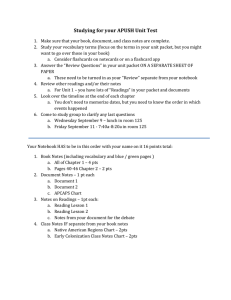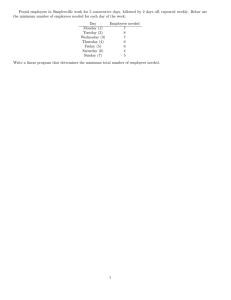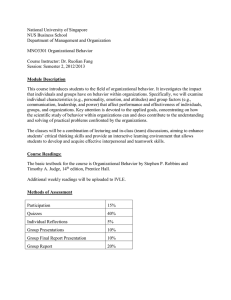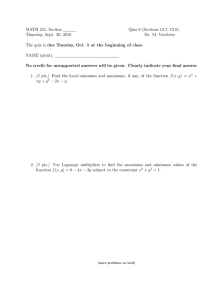Social Work 360
advertisement
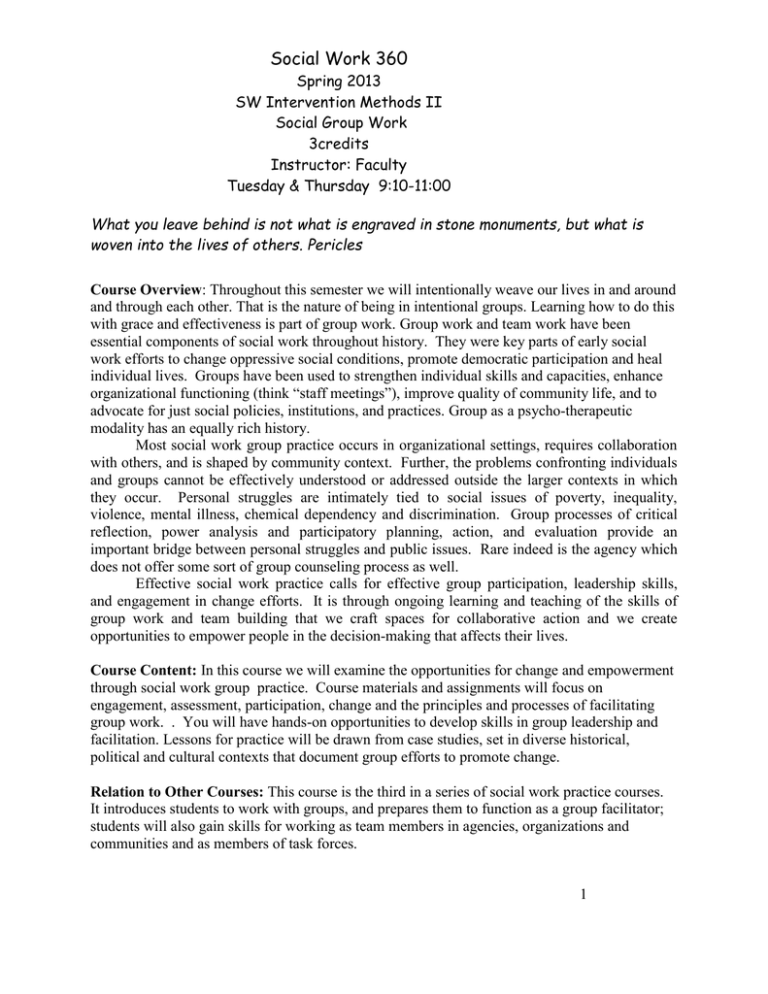
Social Work 360 Spring 2013 SW Intervention Methods II Social Group Work 3credits Instructor: Faculty Tuesday & Thursday 9:10-11:00 What you leave behind is not what is engraved in stone monuments, but what is woven into the lives of others. Pericles Course Overview: Throughout this semester we will intentionally weave our lives in and around and through each other. That is the nature of being in intentional groups. Learning how to do this with grace and effectiveness is part of group work. Group work and team work have been essential components of social work throughout history. They were key parts of early social work efforts to change oppressive social conditions, promote democratic participation and heal individual lives. Groups have been used to strengthen individual skills and capacities, enhance organizational functioning (think “staff meetings”), improve quality of community life, and to advocate for just social policies, institutions, and practices. Group as a psycho-therapeutic modality has an equally rich history. Most social work group practice occurs in organizational settings, requires collaboration with others, and is shaped by community context. Further, the problems confronting individuals and groups cannot be effectively understood or addressed outside the larger contexts in which they occur. Personal struggles are intimately tied to social issues of poverty, inequality, violence, mental illness, chemical dependency and discrimination. Group processes of critical reflection, power analysis and participatory planning, action, and evaluation provide an important bridge between personal struggles and public issues. Rare indeed is the agency which does not offer some sort of group counseling process as well. Effective social work practice calls for effective group participation, leadership skills, and engagement in change efforts. It is through ongoing learning and teaching of the skills of group work and team building that we craft spaces for collaborative action and we create opportunities to empower people in the decision-making that affects their lives. Course Content: In this course we will examine the opportunities for change and empowerment through social work group practice. Course materials and assignments will focus on engagement, assessment, participation, change and the principles and processes of facilitating group work. . You will have hands-on opportunities to develop skills in group leadership and facilitation. Lessons for practice will be drawn from case studies, set in diverse historical, political and cultural contexts that document group efforts to promote change. Relation to Other Courses: This course is the third in a series of social work practice courses. It introduces students to work with groups, and prepares them to function as a group facilitator; students will also gain skills for working as team members in agencies, organizations and communities and as members of task forces. 1 Important Course Policies: The number one course policy revolves around attendance and responsibility. You are expected to be here and to participate. When you are assigned to lead a group or participate in a group as a group member or contribute your labor to a group’s efforts you simply must be here. There is no way around that. I am well aware that life gets complicated. But when a group of people count on us we really have no choice but to be there for them. We can’t reschedule an entire group with the same ease we can re-schedule an individual meeting or appointment. And groups tend to move very, very quickly. Being absent from one group meeting can put you light years behind, leave you out, and send the message that your mates can not count on you. If you intend to be a practicing social worker you must demonstrate your ability to be responsible to those who count on you. If your life looks crazy, hectic, over loaded with obligations, and stressful I am going to suggest you find an alternative time to take the class. If you miss class meetings and are not excused then I will meet with you for the purpose of suggesting you drop the course. This behavior will also substantially reduce your grade. Academic Misconduct: Academic misconduct is subject to an academic penalty by the course instructor and/or a disciplinary sanction by the University of Montana. All students need to be familiar with the Student Conduct Code. The Code is available for review online at www.umt.edu/SA/VPSA/index.cfm/page/1321 Disability Accommodation: Students with disabilities who wish reasonable accommodations should notify UM Disability Services and present documentation of accommodations needed to the instructor. Face to Face and On-Line Time: In this class you are asked to divide your time between faceto-face work and on-line work. For the first two weeks of class we will meet as a class face-toface on both Tuesday and Thursday. For the 3rd through the 8th weeks of class you will be in the field running groups with diverse agencies. On one day during those weeks you will be in the field and on the other day of the week you will be doing on line activities on your own. These will include readings, a quiz, a discussion entry and a knowledge generation entry. After we have participated in group work in the field for 6 weeks we will meet to process our experiences and then it is back to the field. Shulman, L. (2009). The skills of helping Individuals, families, groups and communities (6th ed.). Kaner, S. (2009). Facilitator’s guide to participatory decision-making. Readings: Readings are assigned on a weekly basis. I will not take the time to tell you what is in the readings. You must do the readings for yourself. And use the knowledge you have gleaned from the readings to assist you in making wise practice decisions in the field, completing the quiz, participating in the discussion forum and generating knowledge. On the days when we meet face-to-face, please have done your readings prior to coming to class. On the days when we are in the field, please have done your readings prior to heading into the field. All weekly reading assignments are posted on Moodle. Course Objectives: Here are the course objectives and how you will meet them this semester. You will be leading and participating in mutual aid groups, meetings and task groups. 2 Learning Goals 1: Understand the relationship between of group work, meetings and task forces taking an empowerment approach to generalist social work. Learning Outcomes Students co-facilitate six weeks of group activities for clients in the field. Class will be divided into two groups; Group one will be in the field on Tuesday and on-line on Thursday. Group two will be in the field on Thursday and on line on Tuesday. 2: Understand how the values and ethics of the social work profession (i.e. respect for human diversity, social justice, self determination and equality) influences the development and implementation of intervention strategies in agencies with groups and. Ethical dilemmas will be documented and processed through a series of group logs submitted weekly via a graded discussion forum on Moodle. 3: Know group stages and processes in mutual aid, task and problem solving groups. Student experience with each stage, with processes and in the Problem solving groups will be documented weekly. 4: Identify and practice skills of group work including group formation, assessment and planning, group development and intervention and evaluation and termination. Through a series of guided discussions students will verbally Express their fluency with the language necessary for forming and Facilitating groups and team meetings. 5: Become competent group facilitators, knowledgeable of group stage development and skilled at facilitating the beginning, middle and ending phases of task, educational and mutual aid groups. Each stage of group development will be documented through student logs. 6: Identify evaluation methods for assessing the effectiveness of intervention efforts with groups and teams Goals, objectives and outcomes for each group will be specified, observed and documented through student written work on Moodle discussion board. Practice groups in community Weekly quiz on readings, each……………………. Weekly knowledge sharing, each……………………… Weekly discussion, each ……………………………… Paper on group process……………………………….. 10 pts 10 pts 10 pts. 30 pts. 3 Group Work involvement -Journals -Final-reflection paper…………………………………… 451 - 500 points 436 - 450 points 401 - 435 points 381 - 400 points 351 - 380 points 301 - 350 points 0 - 300 points 30 pts 10 pts. 10 pts. _____ A B+ B C+ C D F Course Assignments and Due Dates: All written assignments are due by Week 13. However, I highly recommend that you not wait until that time to turn your work in as you will simply not be able to complete a semester’s worth of written work under pressure. Instead, pace yourself. Decide when it makes the best sense for you to finish your written work. Turn it in all along. I will not give extensions. I will not allow you to turn your work in late. It is due on Week 13 and that is when it is due. Please plan accordingly. Paper on Group Process This work requires you to reflect on your role in the group process. What did you contribute? How was that for you? Why was your contribution important to the life and sustenance of the group? What were the power dynamics you observed? What issues surfaced as important in the life of students? It also asks you to talk about the stage of the group, how you knew it was in a particular stage and to bring in at least two articles on the stages of group development to document what you observed or experienced. Course Schedule: please see Moodle for the weekly course schedule of readings and assignments. 4
